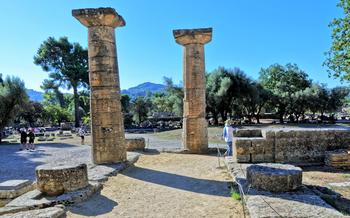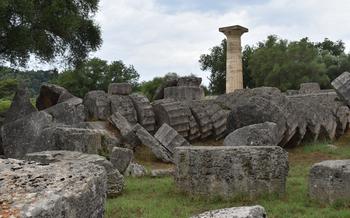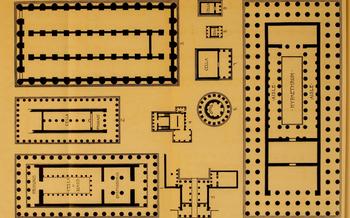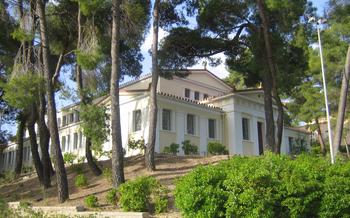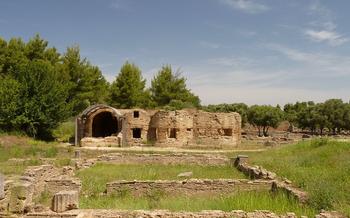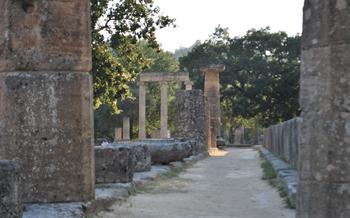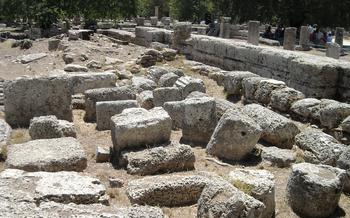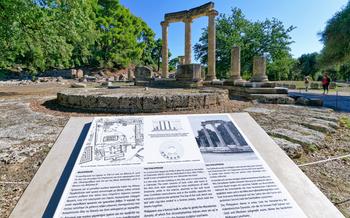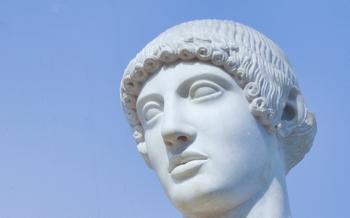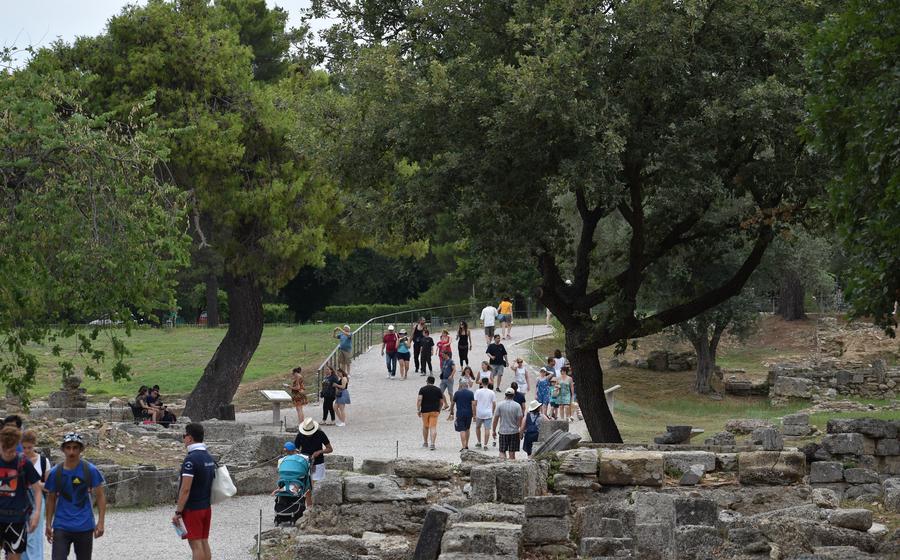
Temple of Epicurean Apollo
- The Temple of Epicurean Apollo: A Masterpiece of Ancient Greek Architecture
- Location and Accessibility
- Opening Hours and Admission Fees
- Planning Your Visit
- Guided Tours and Audio Guides
- Photography Tips
- Respecting the Archaeological Site
- Exploring the Surrounding Area
- Accommodation Options
- Dining and Refreshments
- Accessibility for Visitors with Disabilities
- Weather Conditions and Precautions
- Respecting Local Customs and Traditions
- Language and Communication
- Insider Tip: Unveiling Hidden Treasures
The Temple of Epicurean Apollo: A Masterpiece of Ancient Greek Architecture
Nestled amidst the picturesque hills of Peloponnese, Greece, stands the Temple of Epicurean Apollo, a testament to the ingenuity and artistry of ancient Greek civilization. Dedicated to Apollo, the Greek god of healing and prophecy, this temple was constructed around 450 BC and is considered one of the finest examples of Doric architecture. Its well-preserved state, coupled with its stunning location, makes it a must-see attraction for history and architecture enthusiasts.
The temple's design is characterized by its simplicity and elegance. The exterior features 34 Doric columns, each standing over 6 meters tall, that support the temple's entablature and pediments. The pediments, which adorn the east and west ends of the temple, are adorned with exquisite sculptures depicting scenes from Greek mythology. The interior of the temple, though less elaborate than the exterior, houses a cella, where a statue of Apollo once stood, and an adyton, a sacred chamber that was likely used for divination.
The Temple of Epicurean Apollo is not just an architectural marvel but also holds significant historical importance. It was built in honor of Apollo, who was believed to have intervened in the Battle of Plataea in 479 BC, leading to the victory of the Greeks over the Persians. The temple's construction served as a symbol of gratitude to the god and a reminder of the Greek triumph.
In recognition of its exceptional cultural and historical value, the Temple of Epicurean Apollo was designated a UNESCO World Heritage Site in 198This prestigious designation highlights the temple's importance in preserving and showcasing the rich cultural heritage of Greece, making it a must-visit destination for anyone interested in ancient history and architecture.
Location and Accessibility
Situated amidst the picturesque landscapes of the Peloponnese peninsula, the Temple of Epicurean Apollo is a testament to ancient Greek architectural prowess. Conveniently located near Olympia, the birthplace of the Olympic Games, the temple offers easy access to this iconic historical site. For those relying on public transportation, buses and trains connect major cities to Olympia, providing a hassle-free journey. Alternatively, renting a car allows for a flexible and independent exploration of the region, enabling visitors to uncover hidden gems and neighboring attractions at their own pace.
Opening Hours and Admission Fees
The Temple of Epicurean Apollo welcomes visitors throughout the year, with varying opening hours depending on the season. During the summer months (April to October), the temple is open from 8:00 am to 8:00 pm daily. In the winter season (November to March), the hours are slightly shorter, from 8:00 am to 5:00 pm.
Admission fees are charged for entry into the temple grounds. The standard ticket price for adults is €12, while students and children can enjoy reduced rates. Guided tours are available for a more in-depth exploration of the temple's history and architecture, with prices typically ranging from €15 to €20 per person.
To avoid disappointment and long queues, especially during peak tourist season, online booking is highly recommended. The temple's official website offers a convenient platform for purchasing tickets in advance, ensuring a seamless and hassle-free visit.
Planning Your Visit
When planning your visit to the Temple of Epicurean Apollo, consider the best time of year to experience its grandeur. Spring and fall offer pleasant weather, avoiding the scorching summer heat and the chilly winter conditions. These seasons also coincide with fewer crowds, allowing you to immerse yourself in the temple's serenity without the hustle and bustle of peak tourist season.
Aim to spend at least an hour exploring the temple and its surroundings. This will give you ample time to admire its architectural details, soak in the panoramic views, and capture some stunning photographs. You can combine your visit to the temple with a trip to nearby Ancient Olympia, the birthplace of the Olympic Games. This will provide a comprehensive immersion into the rich history and culture of Greece.
Guided Tours and Audio Guides
To enhance your visit to the Temple of Epicurean Apollo, consider joining a guided tour. These tours are led by knowledgeable guides who can provide historical insights, captivating stories, and anecdotes about the temple and its significance. They will also point out architectural details and sculptures that you might otherwise miss.
For those who prefer self-guided exploration, audio guides are available for rent. These devices offer recorded commentary in multiple languages, allowing you to learn about the temple's history and features at your own pace.
Guided tours and audio guides are available at the temple's visitor center. It's advisable to pre-book your preferred tour, especially during the peak tourist season, to avoid disappointment.
Photography Tips
Capture the majesty of the Temple of Epicurean Apollo through the lens of your camera. Experiment with different angles to showcase its grandeur. The temple's western side offers a stunning view with the sun setting behind the columns. For the best lighting conditions, plan your visit during the golden hours of sunrise or sunset. Use a tripod for stable shots, especially in low-light conditions. Don't forget to capture panoramic images to encompass the temple's harmonious relationship with the surrounding landscape.
Respecting the Archaeological Site
The Temple of Epicurean Apollo is a sacred archaeological site that deserves utmost respect and care from visitors. To ensure its preservation for future generations, it is crucial to adhere to certain guidelines. Firstly, avoid touching or climbing on the ancient structures. These structures are delicate and can be easily damaged if handled inappropriately. Secondly, refrain from littering and dispose of your trash responsibly in designated bins. The site's natural beauty and serenity should be maintained for all to enjoy. Finally, discourage the use of flash photography, as it can harm the delicate sculptures and frescoes. Be mindful of your actions and help protect this invaluable heritage for years to come.
Exploring the Surrounding Area
The Temple of Epicurean Apollo stands as a testament to ancient Greek architectural prowess, but its surroundings offer a wealth of additional attractions to make your visit even more fulfilling. Just a short distance away lies Ancient Olympia, the birthplace of the Olympic Games. Step into this legendary site and marvel at the ruins of the ancient stadium, where athletes competed in the original Olympic events. Explore the Archaeological Museum of Olympia to discover a treasure trove of artifacts that bring the ancient games to life.
Beyond Ancient Olympia, the region beckons with scenic hiking trails that meander through picturesque landscapes. Lace up your hiking boots and embark on a journey through olive groves, cypress forests, and along cascading rivers. The trails offer breathtaking views of the Temple of Epicurean Apollo from unique vantage points, allowing you to appreciate its grandeur from afar.
After a day of exploration, indulge in the region's culinary delights. Traditional Greek tavernas and restaurants abound, serving up mouthwatering dishes prepared with fresh, local ingredients. Sample the flavors of Greece with dishes like succulent grilled meats, flavorful salads, and creamy cheeses, all accompanied by the renowned Greek hospitality.
Venture beyond the temple and discover the charming nearby towns of Andritsaina and Zacharo. These picturesque settlements offer a glimpse into the authentic Greek way of life. Wander through their cobblestone streets, admire the traditional architecture, and soak up the relaxed atmosphere. Whether you're seeking historical wonders, natural beauty, or culinary experiences, the surroundings of the Temple of Epicurean Apollo offer a tapestry of delights to enrich your journey.
Accommodation Options
When planning your visit to the Temple of Epicurean Apollo, consider the various accommodation options available in the vicinity to ensure a comfortable stay. For those seeking a convenient and luxurious experience, there are several hotels and guesthouses located near the temple, offering a range of amenities and services to cater to your needs.
For budget-conscious travelers, camping facilities are available in the area, providing a more affordable alternative. These campsites offer basic amenities, allowing you to immerse yourself in the natural surroundings and enjoy the tranquility of the region.
To avoid any disappointment during your trip, especially during the peak tourist season, it is advisable to book your accommodation in advance. This will guarantee your preferred choice and ensure a hassle-free stay, allowing you to focus on exploring the wonders of the Temple of Epicurean Apollo and its captivating surroundings.
Dining and Refreshments
To enhance your visit to the Temple of Epicurean Apollo, consider indulging in the culinary delights of the region. Nearby tavernas and restaurants offer a tantalizing array of authentic Greek cuisine, allowing you to savor the flavors of this rich culinary tradition. From traditional dishes like moussaka and pastitsio to fresh seafood and succulent grilled meats, the options are endless.
For a truly immersive experience, pack a picnic lunch and find a serene spot amidst the temple's surroundings. As you savor your meal, let the tranquility of the ancient site wash over you, creating a memorable dining experience like no other.
For those seeking a quick bite or refreshment, the temple's visitor center provides a range of snacks and drinks to keep you energized throughout your exploration.
Accessibility for Visitors with Disabilities
The Temple of Epicurean Apollo strives to be accessible and welcoming to visitors of all abilities. The site features several accessibility features to ensure that everyone can have a fulfilling and enjoyable experience.
-
Ramps and Wheelchair Access: The temple grounds are equipped with ramps and designated wheelchair-accessible pathways, allowing visitors with limited mobility to navigate the site with ease.
-
Advance Notice: To ensure the best possible experience, visitors with disabilities are encouraged to inform the temple authorities in advance. This allows the staff to make any necessary arrangements or provide assistance if needed.
-
Alternative Routes and Viewpoints: For visitors with limited mobility who may find it challenging to climb the hill to the temple, alternative routes and viewpoints are available. These routes offer equally stunning views of the temple and the surrounding landscape.
Weather Conditions and Precautions
The Peloponnese region experiences hot and dry summers with temperatures often soaring above 35 degrees Celsius. It's crucial to dress appropriately in light, loose-fitting clothing and apply sunscreen to protect your skin from the intense sun. Carrying a hat, sunglasses, and an umbrella for shade is also recommended.
In contrast, winters in the region can be unpredictable, with occasional rain or even snowfall. Be prepared for cooler temperatures and pack layers of clothing to adjust to changing weather conditions. Waterproof shoes or boots are advisable for navigating wet or muddy trails.
Remember to stay hydrated by carrying a refillable water bottle, especially during summer hikes or outdoor activities. Be mindful of the sun's intensity and seek shade during the hottest hours of the day to avoid heatstroke or sunburn.
Respecting Local Customs and Traditions
When visiting Greece, it is essential to be mindful of local customs and traditions to ensure a respectful and enjoyable experience. Dressing modestly is appreciated when visiting religious sites or conservative villages. Simple gestures like using appropriate greetings and phrases when interacting with locals can go a long way. Tipping is customary in restaurants and other service establishments, but it is generally not expected to be excessive. Learning a few basic Greek phrases can enhance communication with locals and show your respect for their culture. Translation apps or phrasebooks can be useful for overcoming language barriers. Remember, respecting local customs and traditions is not only a sign of politeness but also a way to connect with the community and gain a deeper understanding of Greek culture.
Language and Communication
Navigating language barriers when traveling to Greece is relatively straightforward. Many locals, especially in tourist areas, have a good command of English, making communication easy. English-speaking staff is also commonly found at tourist attractions, hotels, and restaurants.
To enhance your interactions with locals, consider learning a few basic Greek phrases. Simple greetings like "kalimera" (good morning), "kalispera" (good evening), and "efcharisto" (thank you) can go a long way in showing respect and breaking the ice.
If you encounter language difficulties, don't hesitate to use translation apps or phrasebooks to assist you. These tools can help you communicate basic needs and understand essential information.
Insider Tip: To immerse yourself in the local culture, try learning a few traditional Greek dances. Many tavernas and cultural centers offer dance lessons for visitors, allowing you to experience the vibrant spirit of Greece firsthand.
Insider Tip: Unveiling Hidden Treasures
Beyond the awe-inspiring Temple of Epicurean Apollo, the region holds a treasure trove of hidden gems waiting to be discovered. Venture off the beaten path and explore the picturesque village of Andritsaina, nestled amidst lush greenery. Stroll through its charming cobbled streets, admire traditional stone houses, and soak in the authentic Greek atmosphere. Don't miss the opportunity to savor delectable local cuisine at one of the village's traditional tavernas, where you can indulge in mouthwatering dishes prepared with fresh, seasonal ingredients. For an unforgettable experience, embark on a scenic hike through the surrounding mountains, where you'll be rewarded with breathtaking panoramic views of the temple and the Peloponnese countryside. Embrace the warmth and hospitality of the locals, who will gladly share their stories and recommendations, ensuring you create lasting memories in this enchanting region.
